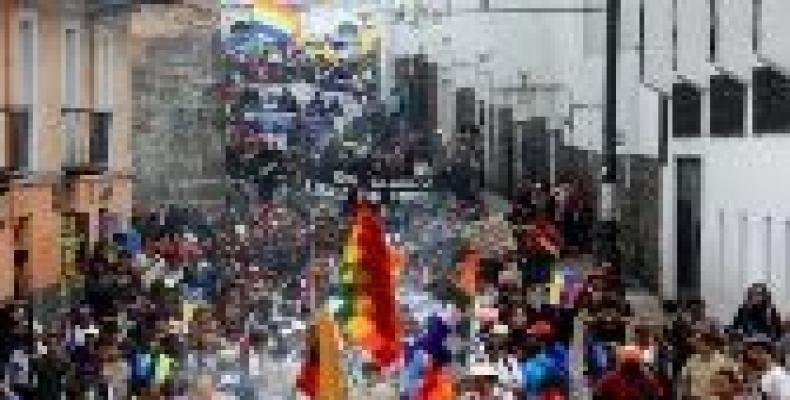Quito, November 16 (RHC)-- In Ecuador, a group of Indigenous women from the Amazon, known as Yasunidos, activists for the protection of national reserve Yasuni, as well a representative from the Ombudsman's office met with Carlos Perez, the Minister of Hydrocarbons of Ecuador, to demand the immediate the reversal of the government’s decision to carry out further oil concessions in territories where the environment and human populations are in danger.
“We’ve come to talk to the minister of Hydrocarbons to see if we can ask for the end of the extension of the oil extraction frontier. No more oil wells because this heavily impacts indigenous women, and the different nations,” Zoila Castillo, from the Teresamana community, in Pastaza Province and president of Confederation of Indigenous Nationalities from the Ecuadorean Amazon (CONFENIAE), told teleSUR.
“Here in Ecuador there is no economy [profits], no type of jobs [job generation through natural resource exploitation], for this [job generation] we are craftswomen and make our own products, I work with my children, I teach [the craft], let’s say with dignity (…) there can also be community-oriented tourism.”
The meeting, lasting longer than an hour, was a forum for peaceful protesters to voice their concerns regarding new concessions and oil exploitation by the state oil company Petroamazonas, in blocks 86 and 87 located partly in Ecuadorean and Peruvian territory, as well as other concurrent activities by the Italian company Agip, in block 10, as well as other priorly existing projects.
During the meeting, a woman speaking on behalf of Amazon women, addressed the minister by saying, “Mr. Minister, we as Amazon Women, [say] not one more step [no more expansion of the extractive frontier], not one more well,” referring to their petition to cease all attempts to carry out further concessions.
For his part, the Ombudsman's spokesman stated: “There is a concrete petition which is basically centered on a direct request that the self-determination of Amazon nations, a collective right is recognized as per the Constitution.”
The spokesman added, referring to the office’s statements and the women’s petition, that it was quite clear that there would be negative impacts from the current extractive projects taking place as well as by Moreno’s administration promotion of new oil extractive projects.
After listening to their demands, Minister Perez stated that he would not allow or condone any type of illegal extractive related-activities to take place under his watch, such as pollution due to toxic spills in rivers.
“Unfortunately, people like me are considered to be enemies of nature, which is totally untrue, I am a defender of nature.” However, speaking on an unrelated issue, the minister referred to cases where local communities conducted illegal mining, switching the focus of the conversation from the concrete demands of the petitioners.
“He didn’t give us any answers, [he] just said he would meet with other ministers and the president of the republic to make decisions and then he will give an answer…so it is [unclear] indecisive, if he or the president will have an answer,” Zalome Aranda, an indigenous woman part of the group, and resident of Morete Cocha community, from Pastaza province, told teleSUR.
On November 19th, the United Nation’s Special Rapporteur on Indigenous People's Rights will be in Ecuador on an official visit to discuss issues related to the community in Ecuador and this recent development will be on the agenda.
Indigenous women protest Ecuador's oil exploitation in Amazon

Articles en relation
Commentaires
Laissez un commentaire
Tous les champs sont requis
En reproduction maintenant
Memorias Culturales
Au suivant
- El Mundo de la Filatelia
- En Contacto
- De Cuba un Disco
Plus de visites
- Lula rejette le blocus de Cuba au sommet de la Celac et met en garde contre l'ingérence
- La levée du blocus américain contre Cuba est demandée en France
- Le gouvernement guatémaltèque est appelé à rejeter les positions extrêmes interventionnistes des États-Unis à l'égard de Cuba
- L'ambassadeur de Cuba au Venezuela remercie la solidarité internationale avec les missions médicales (+Photo)
- Le président Díaz-Canel rentre à Cuba après avoir participé au sommet de la CELAC au Honduras (+Photo)

